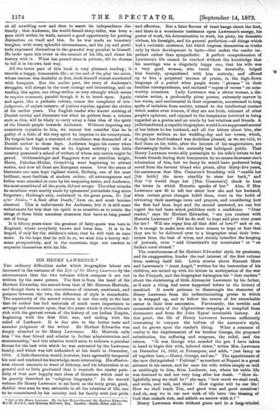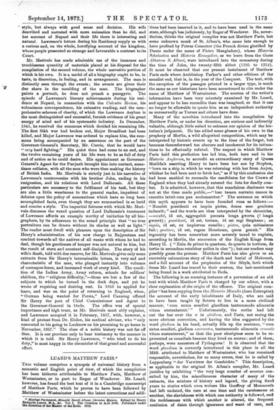SIR HENRY LAWRENCE.*
THE ordinary difficulties under which biographies labour are increased in the instance of the Life of Sir Henry Lawrence by the circumstance that the two volumes which compose it are not written by the same person. The first is from the hand of Sir Herbert Edwardes, the second from that of Mr. Herman Merivale, and though there is entire concurrence of interest, sentiment, and purpose between the two, the difference of style is remarkable. The superiority of the second volume is not due only to the fact that its author has had materials of much more importance to arrange and comment upon, that the years which it chronicles are rich with the gravest events of the history of our Indian Empire, beginning with the first Sikh war, and ending with the relief of Lucknow. It is due also to the better taste and sounder judgment of the writer. Sir Herbert Edwardes was deeply attached to Sir Henry Lawrence. Mr. Merivale calls him "his dear friend and scholar in Indian administration and statesmanship,"and this relation would seem to indicate a peculiar fitness for the task with which he was entrusted by the Lawrence family, and which was left unfinished at his death in December, 1868. A little discretion would, however, have agreeably tempered his zeal and rendered his knowledge more interesting. His effusive- ness almost amounts to want of delicacy, and his admiration is so general and so little graduated that it reminds the reader pain- fully of that now happily rare class of literature which used to be gravely described as "religious biography." In the second volume Sir Henry Lawrence is set forth as the truly great, good, dutiful, wise man he was, estimable in all the relations of life, one to be remembered by his country and his family with just pride
* Life of Bir Henry Lawrence. By the late Major-General Sir Herbert Edwardes,
1.0.5., ; and Herman Merivale, Esq. London: Smith, Fader, and Co.
and affection. But a faint flavour of tract hangs about the first, and there is a wearisome insistence upon Lawrence's energy, his power of work, his determination to work, his piety, his domestic virtnes, his foresight, and his general perfection—all things which had a veritable existence, but which impress themselves as truths only by their development in facts—that makes the reader im- patient rather than sympathetic. A perfect comprehension of Lawrence's life cannot be reached without the knowledge that his marriage was a singularly happy one, that his wife was a very good woman, who loved him devotedly, helped
him bravely, sympathised with him entirely, and offered up to him a perpetual incense of praise, in the high-flown language of a period when people wrote " phrases " in their familiar correspondence, and enclosed "copies of verses" on-note- worthy occasions. Lady Lawrence was a clever woman, a dis- cursive writer, a profoundly pious person, extremely narrow in her views, and sentimental in their expression, accustomed to long spells of isolation from society, unused to the intellectual contact which makes even women, if they are not fools, tolerant of other people's opinions, and exposed to the temptation involved in being regarded as a genius and an oracle by her relatives and friends. A judicious friend, a capable biographer, would have suppressed several of her letters to her husband, and all her letters about him, also the prayer written on her wedding-day and her verses, which, though her fond husband was doubtless pleased, as We are told, to find them on his table, after the labours of his magistrature, are distressingly feeble to the naturally less indulgent public. That Henry Lawrence wrote !Ally postscripts to his wife's letters to-her female friends during their honeymoon by no means decreases one's admiration of him, but we fancy he would have preferred being saved from the fervent friend who prints, after thirty-five years, his assurances that Mrs. Cameron's friendship will "enable her [his bride] the more steadily to steer her bark," and that "it would tinge her [Mrs. Cameron's] cheek to hear the terms in which Honoria speaks of her." Also, if Mrs Lawrence saw fit to tell her sister how she and her husband, when certain great changes befell them, were in the habit of reviewing their marriage vows and prayers, and considering how the first had been kept and the second answered, we can but regret the bad taste which publishes such a confidence. "Dear reader," says Sir Herbert Edwardes, "are you content with Honoria Lawrence? Did he do well to hope and pine nine years for her? Will she repay him all that debt of love?" and so on. It is enough to make men who have reason to hope or fear that they are to be delivered over to a biographer steal their love- letters from the best of wives, and sternly interdict the keeping of journals, even "mid Greenland's icy mountains" or "on India's coral strand."
The vexatiousness of Sir Herbert Edwardes' style, its prosiness, and its exaggeration, hinder the real interest of the first volume from making itself felt. Little stories about Hannah More and Lawrence's "Aunt Angel," written for the instruction of his children, are mixed up with his letters in anticipation of the war in the Punjaub, and the biographer harangues his "dear readers" about the christening of little Alexander Lawrence by his father, as if such a thing had never happened before in the history of mankind. It needs patience to disentangle the character of Henry Lawrence from the indiscriminating praise in which it is wrapped up, and to follow the events of his remarkable career in their true succession. Fortunately, the terrible and memorable story of the Afghanistan campaign is compiled from documents and from Sir John Keyes' invaluable history. At this point, the life of Henry Lawrence becomes sufficiently interesting to conquer the tedium of the narrator's style, and he grows upon the reader's liking. What a romance of reality is the imprisonment of his brother George, the proposed substitution,, the suffering and suspense, the relief, and the
return; "It was George who mended the pen I have taken in hand to begin this with, beloved sister," writes Mrs. Lawrence on December 14, 1842, at Ferozepoor, and adds, "just fancy US
all together here,—Henry, George, and me." The appointment of the now distinguished " Political " as resident at Nepaul is a great advance in his career, and for once his wife writes simply as well as exultingly to him, from Lucknow, too, where his noble life was destined to end not very long after her death. "How de-
lightfully snug we shall be!" she says, "how much we shall read, and write, and talk, and think ! How regular will be our life! flow we shall teach Tim, and grow wise and good ourselves! And oh, may we in our new walk of life have 'the blessing of God that maketh rich, and addeth no Borrow with it I" Henry Lawrence wrote without grace and in a long-winded,
— style, but always with good sense and decision. His wife described and narrated with more animation than he did, and her account of Nepaul and their life there is interesting and natural. Lawrence's letters during his Residency supply us with a curious and, on the whole, horrifying account of the kingdom, whose people presented so strange and favourable a contrast to its Court.
Mr. Merivale has made admirable use of the immense and troublesome quantity of materials placed at his disposal for the compilation of the second volume, the whole narrative portion of which is his own. It is a model of all a biography ought to be, in taste, in discretion, in feeling, and in arrangement. The man is distinctly seen through the events ; the events are given their due share in the moulding of the man. The biographer paints a portrait, he does not preach a panegyric. The episode of Lawrence's literary achievements during his resi- dence at Nepaul, in connection with the Calcutta .Review, his voluminous correspondence, his extensive reading, and the com- prehensive schemes of charity, of which the Lawrence Asylum is the most distinguished and successful, furnish evidence of his great energy of mind and of his systematic industry. In December, 1845, he received the summons which decided his remaining life. The first Sikh war had broken out, Major Broadfoot had been killed, and Major Lawrence was ordered to replace him, the sum- mons being accompanied by an assurance on the part of the Governor-General's Secretary, Mr. Currie, that he would have • " very hard fighting." His quiet time had come to an end, and the twelve remaining years of his life were to be as full of duty and of action as he could desire. His appointment as Governor- General's Agent for the Punjaub brought him into contact, some- times collision, with all the men who were then making the history of British India. Mr. Merivale is strictly just in his narrative of Lawrence's controversies with his brother John, ending in his resignation, and his relations with Lord Dalhousie. AU these particulars are necessary to the fulfilment of his task, but they are also a little wearisome to the general reader, impatient of debates upon the policy of annexations which have so long been accomplished facts, even though they are summarised in so lucid and concise a style. The impartial fairness with which Mr. Meri- vale discusses the vexed question of Lord Dalhousie's treatment of Lawrence affords an example worthy of imitation by all bio- graphers, by its adherence to the sound principle that "no trim portraiture can be drawn without its shades as well as light." The reader must dwell with pleasure upon the description of Sir Henry's administration of his new charge in Rajpootana and conduct towards all the natives of all rants with whom he had to deal, though his gentleness of temper was not natural to him, but the result of stern and constant self-discipline. The story of his wife's death, told with due reserve, for Mr. Merivale gives only some extracts from Sir Henry's interminable letters, is very sad and characteristic of the man, who plunged instantly into volumes of correspondence, and increased work of every kind. The condi- tion of the Indian Army, Army reform, schools for soldiers' children, the "religious difficulty,"—these are but a few of the subjects to which he turned in the dark days, and yet he wrote of requiring and desiring rest. In 1856 he applied for leave, and was on the point of returning to England, when, " Outram being wanted for Persia," Lord Canning offered Sir Henry the post of Chief Commissioner and Agent to the Governor-General in Oude. The office was of special importance and high trust, as Mr. Merivale most ably explains, and Lawrence accepted it in February, 1857, with, however, a kind of protest from Dr. Ebden, his medical adviser, who "only consented to his going to Lucknow on his promising to go home in November, 1857." The close of a noble history was not far off then. It is our province only to bear testimony to the manner in which it is told. Sir Henry Lawrence, "who tried to do his duty," is most happy in the chronicler of that grand and successful effort.



































 Previous page
Previous page